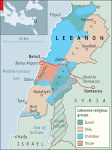When we read this headline, we immediately thought the worst: Israel is beginning an air-assault on Hezbollah and its allies. Fortunately, however, the headline ten minutes later relatively assuaged our fears: "LBCI: The Army is detonating several explosives in the area of Damour."
But our fears are not unfounded. In addition to the tragic history of Israel's periodic invasions and bombing campaigns (most recently, of course, the July 2006 war), Israeli officials are making increasingly bellicose statements. As the Israeli daily, Haaretz reported today:
On Sunday, former IDF chief of staff Amnon Lipkin-Shahak said Hezbollah's persistent attempts to take over Lebanon could eventually benefit Israel in its struggle against the militant group.(Just as I copied and pasted that quote, I heard the roar of a jet fly over the city. I wasn't able to see anything in the bright afternoon sky, but keep in mind, Beirut's airport is still closed.) This continued coupling of Lebanon and Gaza, as I mentioned yesterday, is neither an accurate analysis nor a good sign. Likewise, Ramon's contention that "Lebanon must be viewed as a Hezbollah state" is both absurd and troubling. I think there are a few people here on all sides of the political landscape who would beg to differ.
"If an armed conflict erupts it will be simpler to strike Lebanon when Hezbollah is the legitimate ruler," Shahak told the Army Radio.
Earlier on Sunday, Israel's Vice Premier Haim Ramon told cabinet members that Lebanon must be viewed as a "Hezbollah state," after the Shiite guerilla group seized control over the western part of the Lebanese capital over the weekend.
"Lebanon has no government. It is a fiction, there is only Hezbollah," Ramon said during the weekly cabinet meeting. "Hezbollah is directly responsible for everything that happens [in Lebanon], and the organization completely controls the state."
Later in the cabinet meeting, Minister Ami Ayalon called for an emergency meeting of the political-security cabinet to discuss the ongoing crisis in Lebanon and Gaza.
There is certainly broad popular support in Lebanon for Hezbollah and its allies. But it just so happens that most of the people I come into contact with are vehemently opposed to them. The furor with which these friends and colleagues of mine speak of the March 8th opposition and the events of the past several days is enough to make a foreigner keep his mouth shut, lest he accidentally says something offensively inappropriate. But there is scarcely a person in Lebanon who wants Israel to drop a carpet of bombs aimed at Hezbollah.
If an Israeli attack does seem imminent, we will leave the country. But for now, we're still in the realm of speculation, saber-rattling, and innuendo.
Meanwhile, within the borders of Lebanon, things continue to teeter on the edge between a viable settlement and increasing violence. I like Rami Khouri's analysis of the situation in today's Daily Star:
The consequences of what has happened in the past week may portend an extraordinary but constructive new development: the possible emergence of the first American-Iranian joint political governance system in the Arab world. Maybe.
If Lebanon shifts from street clashes to the hoped-for political compromise through a renewed national dialogue process, it will have a national unity government whose two factions receive arms, training, funds and political support from both the United States and Iran. Should this happen, an unspoken American-Iranian political condominium in Lebanon could prove to be key to power-sharing and stability in other parts of the region, such as Palestine, Iraq and other hot spots.
Insha'Allah (God willing).

No comments:
Post a Comment